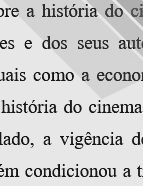

................................
His natural growth within the Cinemateca served to reinforce the idea that this cinephile had become a crucial element in the construction of the institution's identity, under his directorship between 1991 and 2009. The guiding principles behind the Cinemateca's programming and editorial activity reflected the strong core ideas that marked the personality of this director. By the same token, the personal appraisal of a kind of authorial cinema, conveyed from the mid-1960s onwards, mainly in the pages of O Tempo e o Modo [Time and Mode], gradually became, in general terms, the institution's official vision of Portuguese cinema over the last decades.
In the early 1990s, on the occasion of the Portuguese exhibition at Europalia, Bénard da Costa produced a work that falls within the scope of a fairly large set of summaries on Portuguese culture, Histórias do Cinema [Cinema Stories] (Imprensa Nacional Casa da Moeda [National Mint], 1991), which marked the end of a period in Portuguese film historiography. The great merit of this work lies in the apt combination of cinematographic events and the political and social history of the country, integrating cinema as a kind of cultural complement to the evolution of society. Furthermore, it attempts to establish a conception of a history of Portuguese cinema based on a former approach to history, namely by placing particular emphasis on the main guardian figures and their periods of greatest influence.
In his fascinating work on Portuguese film criticism in the 1960s and 1970s, Eduardo Paz Barroso defines what he terms as "Bénard da Costa's canonical perspective": through his ironic writings, Bénard da Costa "achieves a personal and authoritative vision of the cinema made in our midst," calling upon his own cinematic experiences and memories as justification and legitimation. Given Bénard da Costa’s influence on the critical construction of Portuguese cinema, Paz Barroso admits that "it is perfectly acceptable to say that João Bénard da Costa is to Portuguese cinema what Harold Bloom is to Western literature." (Barroso, Eduardo Paz, Justificação [Justification...], 2002, pp. 73-76).
